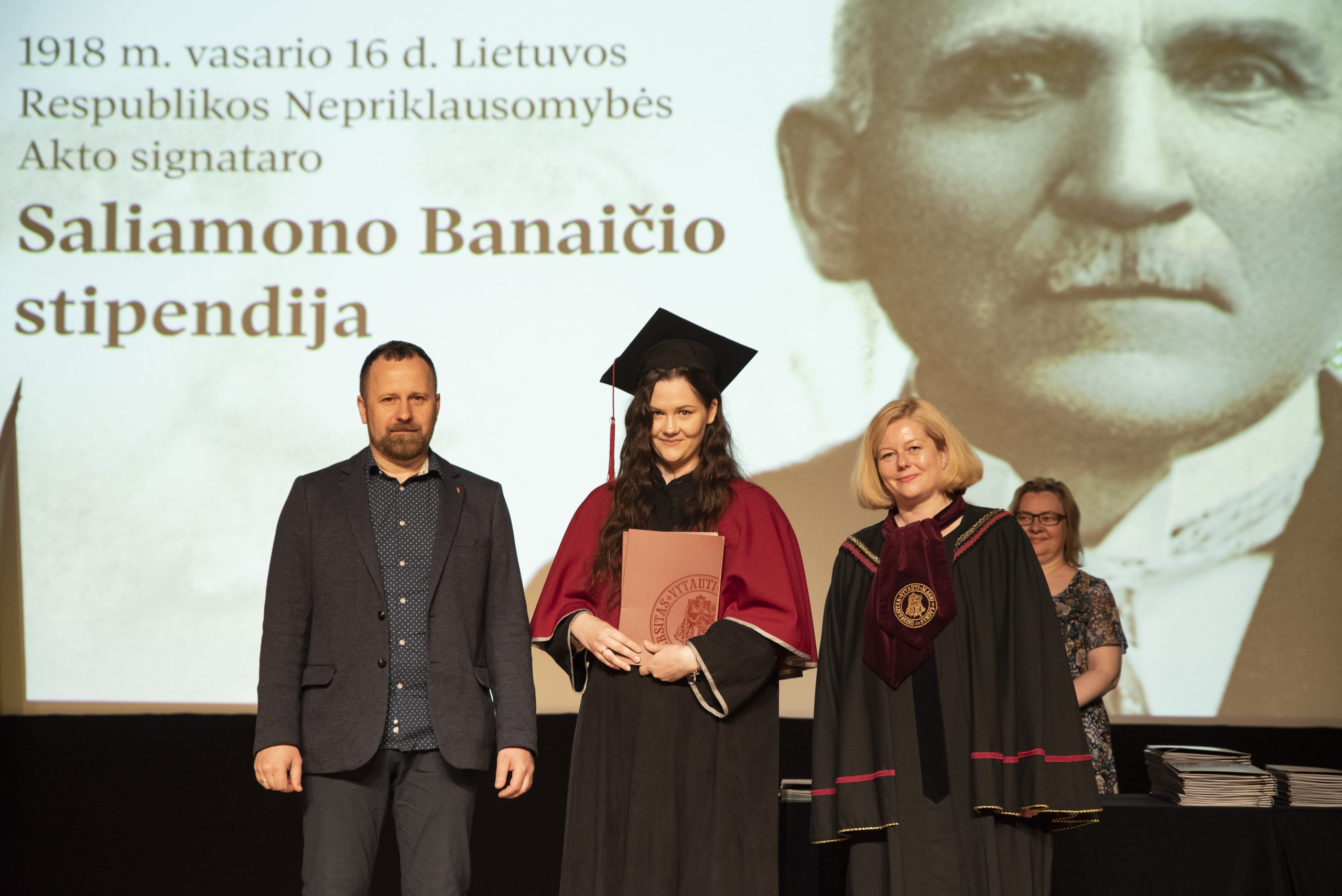Scholarship of S. Banaitis Awarded for Researching Eastern Cultures

Greta Dirsė, a student of the master’s in History of the Central Eastern European Region and Lithuania at the Faculty of Humanities of Vytautas Magnus University (VMU), has been awarded the fifth nominal scholarship of 2329,48€, established by the signatory of the Act of Independence of the Republic of Lithuania, Mr. Saliamonas Banaitis.
The Saliamonas Banaitis scholarship was established at the university in 2016, by his grandchildren who are currently living in Canada, in honour of the occasion of the 100th anniversary of the restoration of Lithuanian statehood. The purpose of this scholarship is to support and encourage the most talented students of the University, who are conducting research on the personalities, events, processes, and organisations of the period of First Independent Republic of Lithuania (from 1918 to 1940), which, in one way or another, are related to the activities of the signatory Mr. Banaitis and his environment.
The first scholarship in the name of Mr. Banaitis was awarded in 2016 to Ms. Neringa Krikščiūnaitė, a graduate of the master’s degree Programme in Art Curation at the Faculty of Arts of VMU, who was interested in and researched the work of the interwar Lithuanian artist Ms. Marija Minginaitė. The second scholarship was awarded in 2018 to Mr. Gediminas Kasparavičius, a PhD student of History at the Faculty of Humanities, who was researching the history of the “Lithuanian Steamship Company“. In 2020, the third scholarship was awarded to Ms. Gerda Pilipaitytė, a PhD student in Philology at the VMU, for her research paper “The life and works of Julija Pranaitytė: ethnic and intercultural aspects”, and in 2021, the scholarship was awarded to Ms. Paulina Okunytė, a master’s student in Creative Industries at the Faculty of Arts, who conducted the research on the development of Lithuanian culture and family economy.
The fifth scholarship awardee, Mrs. Dirsė has conducted the research named “Dissemination of oriental cultures in Lithuania 1918-1939: from an individual to society”. In her work she has examined and reviewed both the public figures of the interwar period who disseminated Eastern cultures individually, by their own works, and the personalities who disseminated oriental cultures as members of societies or organisations. “During the writing of this thesis, I got acquainted with the works, activities and hobbies of many famous Lithuanian personalities who were in one way, or another connected with the Eastern cultures,” said Mrs. Dirsė.
In her work, the awardee of the scholarship described the well-known travels of Mr. Matas Šalčius and Mr. Antanas Poška, which enabled the inhabitants of interwar Lithuania to get acquainted with distant cultures through the tourism and discussed the activities of the relatively little-studied Rerich Society, whose members spread Eastern cultures by publishing a magazine, organising social events, and by sharing knowledge about the activities of this Society at their workplaces. The work also discusses the lecturers of VMU, who shared information on Eastern cultures to their students by introducing them to the Eastern cultures, arts, and religions, for example, Mrs. Marija Rudzinskaitė-Arcimavičienė, who introduced her students to the culture of Egypt; Mr. Jurgis Baltrušaitis, who presented the synthesis of Eastern and Western arts; Mr. Chaimas Nachmanas Shapiras, who encouraged his students to learn about the Semites and their culture; and of course, Mr. Saliamonas Banaitis, who prepared translations of seven Japanese fairy tales into Lithuanian language.
The awardee, Mrs. Dirsė was fascinated by Asian culture while studying the study programme of Languages and Cultures of East Asian Countries, but she has also always been interested in history as well, therefore, her choice of studying a master’s degree in History of Middle East Europe and Lithuania was a perfect opportunity to discover connections between these two study programmes. “In my research projects and theses, I have analysed the manifestations of Asian cultures, history, and politics in Lithuanian history. This is how I also wrote this final thesis – combined the knowledge I had gained during my bachelor’s and master’s studies,” said Mrs. Dirsė.
Mrs. Greta Dirsė says that the successful defence of her thesis and the awarding of the Mr. Saliamonas Banaitis Scholarship is a very important recognition and a great incentive and motivation for her to expand her research in the future and to continue working in this direction as well as to continue her research on the dissemination and development of Eastern cultures in Lithuania. “I believe that this research is relevant not only to students of Lithuanian history, but also to students of East Asian cultures and languages”.
Mr. Saliamonas Banaitis (15.07.1866 – 04.05.1933) was a public and state figure of independent Lithuania, a member of the Council of Lithuania, the signatory of the Act of Independence of Lithuania, and a former student of Vytautas Magnus University.













